From an evolutionary point of view, Staphylococcus aureus is one of the most successful bacteria out there. Over millions of years, it has evolved the uncanny ability to hijack the human immune system before turning it on itself. A new research now showcases how this is achieved, and highlights new potential avenues of research in addressing this problem.
S. aureus infections can be very devastating, especially for people with weak immune systems or preexisting conditions. In hospitals, some colonies have learned how to turn antibiotics ineffective, and became resistant to drugs (MRSA bacteria).
Scientists at the University of Chicago were recently able to figure out how this is done. In a paper published in the November 15 issue of the top journal Science, the team reveals that S. aureus is capable of using neutrophil extracellular traps (NET) created by the immune system to its own ends.
These traps are structures made out of DNA and proteins that immobilize pathogens until white blood cells called macrophages can destroy them. NET are produced by red blood cells called neutrophiles.
When the immune system detected S. aureus, these cells were immediately dispatched to the infection site. NET were immediately produced around the bacteria, but this is where the microorganism's extreme adaptability came to light.
Whenever S. aureus is ensnared in NET, it can convert the traps into a chemical called 2'-deoxyadenosine (dAdo), which is extremely toxic to macrophages. This substances was discovered using high performance liquid chromatography and mass spectrometry techniques, the team says.
Infections caused by this bacteria are oftentimes characterized by a lack of white blood cells, and researchers have always wondered why this happens. The study provides an elegant, complete explanation for this mystery, and opens the way for the development of therapies against infections.
“These bacteria have endowed themselves with weapons to not only anticipate every immune defense, but turn these immune defenses against the host as well,” says the senior author of the Science study, Olaf Schneewind, MD, PhD, quoted by EurekAlert.
The expert holds an appointment as the chair of the Department of Microbiology at the University of Chicago. His work was supported by grants from the US National Institute of Allergy and Infectious Diseases and the American Heart Association.

 14 DAY TRIAL //
14 DAY TRIAL //